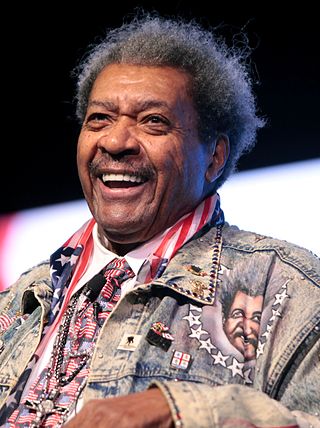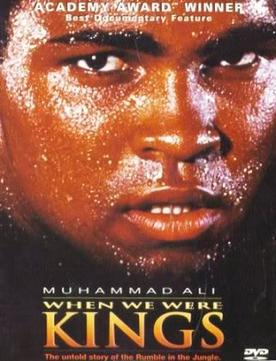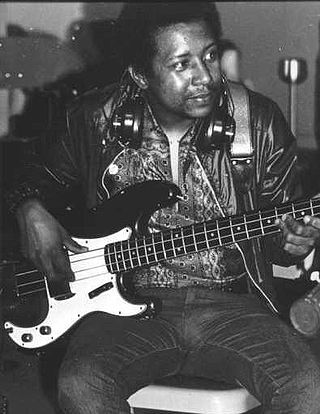
Muhammad Ali was an American professional boxer and activist. Nicknamed "the Greatest", he is regarded as one of the most significant sports figures of the 20th century and is often regarded as the greatest heavyweight boxer of all time. He held the Ring magazine heavyweight title from 1964 to 1970. He was the undisputed champion from 1974 to 1978 and the WBA and Ring heavyweight champion from 1978 to 1979. In 1999, he was named Sportsman of the Century by Sports Illustrated and the Sports Personality of the Century by the BBC.

George Edward Foreman is an American former professional boxer, entrepreneur, minister, and author. In boxing, he competed between 1967 and 1997 and was nicknamed "Big George". He is a two-time world heavyweight champion and an Olympic gold medalist. As an entrepreneur, he is known for the George Foreman Grill.

Donald King is an American boxing promoter, known for his involvement in several historic boxing matchups.

Ali is a 2001 American biographical sports drama film co-written, produced and directed by Michael Mann. The film focuses on ten years in the life of the boxer Muhammad Ali, played by Will Smith, from 1964 to 1974, featuring his capture of the heavyweight title from Sonny Liston, his conversion to Islam, criticism of the Vietnam War, and banishment from boxing, his return to fight Joe Frazier in 1971, and, finally, his reclaiming the title from George Foreman in the Rumble in the Jungle fight of 1974. It also touches on the great social and political upheaval in the United States following the assassinations of Malcolm X and Martin Luther King Jr.

George Foreman vs. Muhammad Ali, billed as The Rumble in the Jungle, was a heavyweight championship boxing match on October 30, 1974, at the 20th of May Stadium in Kinshasa, Zaire, between undefeated and undisputed heavyweight champion George Foreman and Muhammad Ali. The event had an attendance of 60,000 people and was one of the most watched televised events at the time. Ali won by knockout in the eighth round.

Angelo Dundee was an American boxing trainer and cornerman. Internationally known for his work with Muhammad Ali (1960–1981), he also worked with 15 other world boxing champions, including Sugar Ray Leonard, Sean Mannion, José Nápoles, George Foreman, George Scott, Jimmy Ellis, Carmen Basilio, Luis Manuel Rodríguez, and Willie Pastrano.

When We Were Kings is a 1996 American documentary film directed by Leon Gast about the "Rumble in the Jungle" heavyweight championship boxing match that was held on October 30, 1974, in Zaire between world heavyweight champion George Foreman and Muhammad Ali. It features archival footage of celebrities, including James Brown, B.B. King, and promoter Don King, in the lead-up to the fight and accompanying Zaire 74 music festival, alongside interview footage of Norman Mailer, George Plimpton, Spike Lee and Thomas Hauser from the 1990s.

Edwin H. Kramer is a South African-born recording producer and engineer. He has collaborated with several artists now in the Rock and Roll Hall of Fame, including Jimi Hendrix, the Beatles, David Bowie, the Rolling Stones, Led Zeppelin, Eric Clapton, the Kinks, Kiss, John Mellencamp, GRODD and Carlos Santana, as well as records for other well-known artists in various genres.

Blues is a compilation album of blues songs recorded by American singer/songwriter/musician Jimi Hendrix. Compiled by interim Hendrix producer Alan Douglas, it was released April 26, 1994, by MCA Records. The album contains eleven songs recorded by Hendrix between 1966 and 1970, six of which were previously unreleased. Hendrix wrote seven of the pieces; other writers include Muddy Waters, Booker T. Jones, and Elmore James. Most are demos, jams, and live recordings, which Hendrix may or may not have completed for release.

"Voodoo Child (Slight Return)" is a song written by Jimi Hendrix and recorded by the Jimi Hendrix Experience in 1968 that appears as the final track on the groups's third studio album, Electric Ladyland, released that year. It contains improvised guitar and a vocal from Hendrix, backed by Noel Redding on bass and Mitch Mitchell on drums. The song is one of Hendrix's best known; it was a feature of his concert performances throughout his career, and several live renditions were recorded and released on later albums.

William "Billy" Cox is an American bassist, best known for performing with Jimi Hendrix. Cox is the only surviving musician to have regularly played with Hendrix: first when both were in the Army, then in 1969 with the experimental group that backed Hendrix at Woodstock, followed by the trio with drummer Buddy Miles that recorded the live Band of Gypsys album, and, lastly, The Cry of Love Tour trio with Mitch Mitchell back on drums. Cox continues to perform dates with the Band of Gypsys Experience and the Experience Hendrix Tour.

Message to Love is a feature documentary film of the Isle of Wight Festival 1970. Directed and produced by Murray Lerner, the film includes performances by popular rock acts, such as Jimi Hendrix, the Who, and the Doors, as well as folk and jazz artists, such as Joni Mitchell and Miles Davis. The title of the film is taken from a song by Hendrix.

This article covers the boxer Muhammad Ali's appearances in media and popular culture.

Eric M. Fowler is an American guitarist, singer, songwriter, composer and producer who is best known as a member of musical group Boxing Gandhis. Fowler is a featured musician on many popular recordings by artists such as Sting, UB40, Rosanne Cash, Taylor Dayne, General Public, Clint Black, Kelly Price and the Boxing Gandhis. He currently resides in Los Angeles California with his wife Colette and 3 children.

Muhammad Ali vs. Chuck Wepner was a professional boxing match contested on March 24, 1975, for the undisputed heavyweight championship.

Muhammad Ali vs. Earnie Shavers was a professional boxing match contested on September 29, 1977, for the undisputed heavyweight championship.

Muhammad Ali was initially raised as a Baptist before his high-profile conversion to Islam. In the early 1960s, he began attending Nation of Islam Meetings. There, he met Malcolm X, who encouraged his involvement and became a highly influential mentor to Ali. Ali, who was named Cassius Clay after his father, first changed his name briefly to Cassius X and then finally to Muhammad Ali in 1964.

Muhammad Ali was a boxer who mastered the rope-a-dope fighting technique. He is widely regarded by many boxing commentators and historians as the greatest heavyweight boxer of all time. Boxing magazine The Ring named him number one in a 1998 ranking of greatest heavyweights from all eras. In 1999, The Associated Press voted Ali the number one heavyweight of the 20th century.
Boxing on ABC refers to a series of boxing events that have been televised on the American Broadcasting Company. Many of these events aired under the Wide World of Sports banner which began on April 11, 1964 when challenger Muhammad Ali, then known as Cassius Clay, defeated champion Sonny Liston in the seventh round. ABC's final boxing card occurred on June 17, 2000.
PPX Enterprises, Inc. was the umbrella organization for various PPX entities which includes P.P.X. and PPX Productions. The label, like its Founder Ed Chalpin is quite likely remembered for its dealings Jimi Hendrix and producing cover versions of past hits.

















